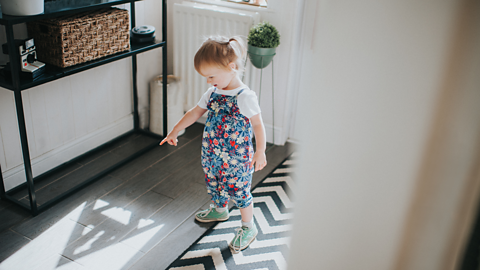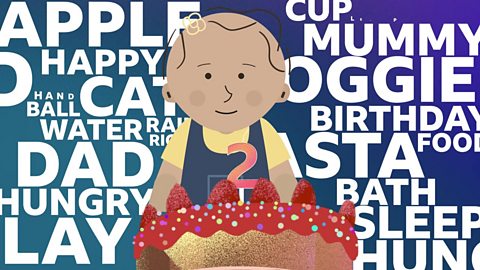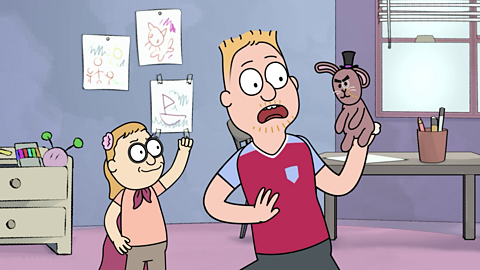During one study of children aged between 14 months and five years, scientists recorded that each child asked an average of 107 questions per hour. One child asked three per minute!
If you're a parent who has been through this stage, this might not surprise you, but every so often a question catches us unawares - maybe it's awkward, funny, sad, or just bizarre, but we can call them all tricky questions.
To understand these questions a little more, we spoke to early years specialist Gaynor Rice, who explains that these questions are very promising for your child's language, social and emotional development.
"Children are born critical thinkers."
She also reacts to some tricky questions sent in by the Tiny Happy People Facebook audience.

Why do children ask tough questions?
Gaynor explains that while young children are brimming with curiosity of the world around them, and have just developed the language skills to pursue that curiosity, they aren't yet "bound by the conventions that adults are when it comes to asking things".
"It links to the stage of social and emotional development where we haven't really got that empathy yet. We haven't got that understanding or this idea that other people might be judging us. Children are very much in the moment."
And this lack of social understanding means children are more than happy to ask questions as and when they pop into their head, while adults are more likely to think about the reaction of the person being asked - would this question make them feel sad or awkward, or more likely to laugh at us?
"When we call it an awkward or a tricky question, that's our feeling, not the child's."
As their social and emotional development progresses - and this often coincides with them starting nursery or school and being around other children their age - they become more aware of the effect on others and less likely to ask questions in such a frank way. So make the most of it while it lasts!
How can parents respond?

Don't panic!
When faced with a tricky question out of the blue, our instinct might push us to the extremes - to try and shut down the conversation or over-explain the subject. Gaynor suggests: take a breath, think about what your child is actually asking and find a middle ground.
Gaynor compares this panic to an old joke: "[A child asks], 'Where did I come from?' And the mother goes into the whole talk of the birds and bees. [And] the child replies], 'Oh, it's just that Johnny down the road said he's from Newcastle and I wanted to know where I'm from."
Be honest and take some time
A lot of the time you won't know how to answer your child's question, whether it's something you might find silly like, 'How do dinosaurs wee?', or something more profound, perhaps about life or death. It's okay to admit when you don't know something.
Gaynor explains that the key to managing a moment like this is creating time for yourself to think of a response, while showing your child that you have interest in their question.
She says, depending on the subject, you might say: "Let me have a think about that and I'll let you know. We can have a talk about that in a little while."
Or if the subject is something you think you could research together, Gaynor suggests that you could say, "You know what, when you come home from school or nursery, why don't we have a look?"
Remember, you know your child best
Depending on their age, their development and their personality, your child might be able to take on more or less information in response to their question. They might not be interested in a detailed answer!
If you're unsure, "Don't go leaping in with a deep explanation and start with the basics. See what you can get away with."
But you'll have the best instinct for how much your child can cope with when it comes to emotional or scientific answers.

Talk to nursery staff and teachers
Sometimes a question might leave you totally bewildered. No matter how many times your child repeats themself, you just don't understand what they mean.
Gaynor says a great way to stay on top of their interests, if your child attends nursery, playgroup or school, is to have a quick chat with their teacher or the staff to see what they've been talking about that week.
"It might change the question completely, then perhaps you're actually looking at something a lot more straightforward."
Respect their question
A child will probably forget your slightly misinformed answer to their question, however, they're a lot less likely to forget if you shut their interest down.
It might seem like a silly question and particularly so if you're busy or have already faced 106 questions in the last hour, says Gaynor. "But 'maybe later when we've had our tea, we can sit down and see if we could find out,' is a respectful way of saying 'I'm interested in what you're asking me. I'm taking that seriously.'"
"And keeping that promise is quite important, but you might find by the time you come round to looking it up, they've moved on."
Encourage more questioning
"Any opportunity to get children to discuss something confidently, to ask questions, has got to be positive."
Simply by following your child's lead and showing interest in their questions, you'll be doing wonders for their language, social and emotional development.
According to Gaynor, these 'opportunities for discussion' will do more than teach them about the world around them, it will benefit their confidence and self-esteem, as well as a skill called 'oracy', which she describes as 'confidence and fluency in speaking'. All important for those starting school!
And you can further encourage questions by letting your child lead conversations and praising them. Gaynor shares an example: "'That's a really good question. I don't always have the answer, but wow, you're good at asking questions!'"
Do you recognise these tricky questions?
Here are a few questions submitted by our Tiny Happy People audience on Facebook - do any of these sound familiar to you?

- How was I born? How did I get in your tummy?
Gaynor: "My eldest daughter was looking at a photo, she was about three and kept going on about where she was, 'Why am I not there? Where am I?' And I was pregnant in the photo, so I said, 'Well, you are there. You're in my tummy.' And we left it there."
"Later, she came running over to me, she said, 'Mummy! I in your tummy?β I said, 'Yes'. And she replied, βYou eat me?!β"
"All that time working it out on her own, 'How could this be?' And that's a clear example of construction of understanding. 'I have to make this fit with my vision of the world."
- Why is water wet?
Gaynor: "There are those children out there, who, if you tried giving a scientific physical explanation of why water's wet, would love every minute of it. But most of them aren't after that depth."
"Even saying 'We have things that are wet and things that are dry in the world' might be enough."
- When will the rain run out?
Gaynor: "The water cycle can be covered by the Understanding the World part of the Early Years Foundation Stage (EYFS)."
"So it's a good chance to explain that it's the same water going round in a circle."
"Children are very visual. There's lots of opportunities for those kind of questions to be have visual answers: some tissue for a cloud and let the water soak into it and then squeeze it out."
- Can our pet come back?
Gaynor explains how this is an example where you can't be too hard on yourself. She recounts the story of a three-year-old girl she knewβ¦
Gaynor: "Their dog died - a very animal-driven family, absolutely heartbroken. The little girl really struggled emotionally."
"After they came back from a holiday, her mum said to me, 'I've done something really dreadful. When our dog died, my daughter asked me where he'd gone, and so I said he'd gone to heaven. And she said, 'Where's heaven?', so I said, 'Well, it's up there in the sky.'"
"'Anyway, we went on our holidays and she was so excited. We got on the aeroplane we took off and she turned and said to me, looking out the window. 'Where's our dog? When do I get to see him?'"
"So sometimes you mean well and get it wrong. But you know what? You can't help that."
- Check out our advice on talking to your child about bereavement
- Why?
Gaynor: "It's the classic, isn't it?"
"They're starting to need explanation rather than just fact. And bear in mind, the motivation might be different - for a lot of them it's enough that it prolongs the conversation with you!"






